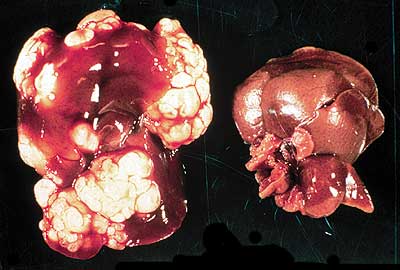Parasites and Diseases
Alveolar Hydatid Disease
A Field Guide
TO COMMON WILDLIFE DISEASES
AND PARASITES IN ALASKA
ALVEOLAR HYDATID DISEASE

Liver from healthy rodent (right) and rodent with Echinococcus multilocularis
| What causes alveolar hydatid disease? |
- Alveolar hydatid disease is caused by a tapeworm known as Echinococcus multilocularis.
- Lifecycle: The adult tapeworm lives in the intestines of foxes (primarily arctic fox, but also red fox and wolf). The adult tapeworms lay eggs. The eggs are passed to the environment in the fox feces. The eggs contaminate vegetation where the feces falls. Rodents (mice, voles, lemmings) eat the vegetation and also ingest the eggs. The eggs develop into larvae in the gut cavity of the rodent. The larvae are enclosed inside of cysts which form large grape-like clusters in the gut cavity. A fox eats the rodent and also ingests the larvae. The cycle is complete when the larvae mature into adults and release eggs in the intestine of the fox.
- Dogs can also harbor the adult stage of the tapeworm in their intestine. Humans can develop larval cysts in the gut cavity if they ingest eggs shed in fox or dog feces.
| Where does alveolar hydatid disease occur? |
- This disease is limited to the western coastal portions of Alaska and islands such as St. Lawrence Island.
| What are the signs of alveolar hydatid disease? |
- Infected dogs and foxes show no outward signs of disease.
- Infected rodents may appear bloated due to the large larval cysts in their gut cavity.
- If the gut cavity of an infected rodent is opened, the large grape-like clusters will be easily observed.
| How can I protect myself? |
- Humans are susceptible to this parasite.
- The larval stage of the parasite which is found in rodents poses no threat to humans.
- Humans should wear gloves when cleaning up dog feces or handling harnesses, and wash hands thoroughly afterwards.
- Worm dogs regularly.
- Dispose of dog feces to avoid contact with parasite eggs.
| Can I eat the meat? |
- Neither rodent meat nor fox meat is typically eaten by humans.
| Samples to collect |
- Dog feces can be submitted to a veterinary lab for a parasite examination.
- Rodents that appear to be infected can be submitted to ADF&G.
- To report an occurrence or to submit a sample for identification/analysis, contact the DWC Wildlife Disease Surveillance reporting hotline 907-328-8354, send an email to dfg.dwc.vet@alaska.gov or visit your local ADF&G office.
